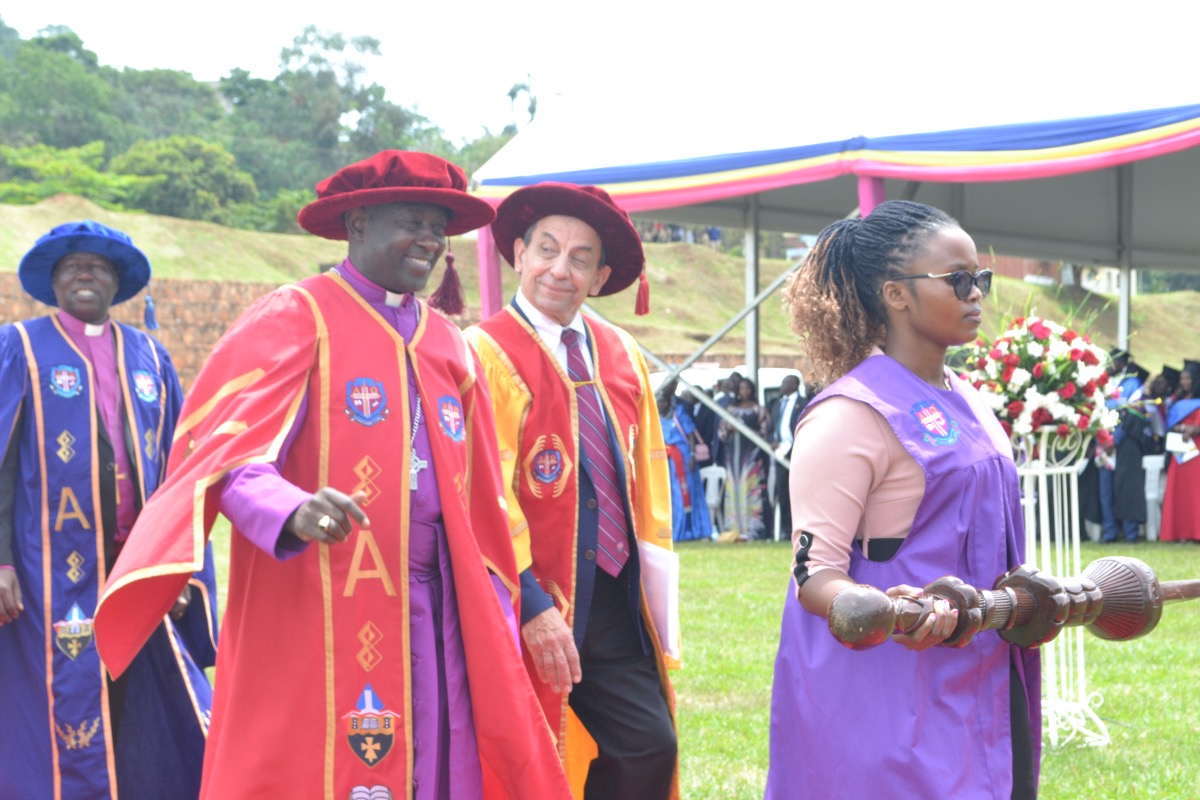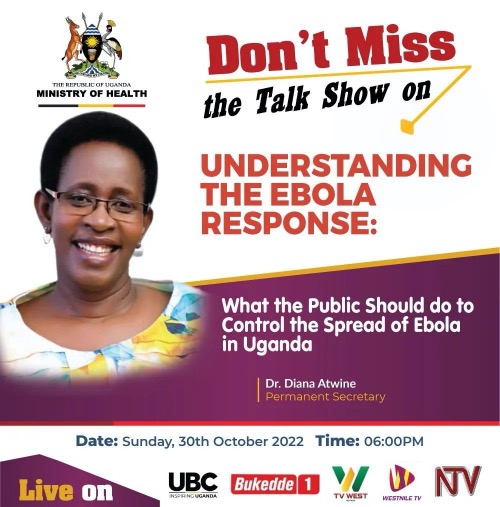Kampala, Uganda
Religious leaders in Uganda have joined politicians and health experts in the country in appealing to members of the public to remain vigilant as Ebola cases rise.
The Archbishop of the Anglican Church of Uganda, the Most Rev Dr Stephen Kaziimba Mugalu, is among those who have appealed to Ugandans to be vigilant.
“We thank God for taking us through the COVID-19 pandemic and securing our country,” he said. “We need to keep vigilant because we have been invaded by another deadly enemy, the Ebola virus, which is said to be one of the most dangerous pathogens.”

Anglican Archbishop Stephen Kaziimba Mugalu (center) and other officials arriving for the 23rd graduation ceremony at Uganda Christian University on 28th October. PICTURE: Laura Cenge.
Kaziimba made the remarks while officiating at Uganda Christian University’s 23rd graduation ceremony on 28th October at the main campus in Mukono.
Kaziimba, the university’s chancellor, asked the public to work together to raise awareness of hygiene practices and encourage each other to take the necessary precautions and adhere to the advice from the health workers and government.
He reminded the public that Ebola is transmitted through direct physical contact with a sick person and that according to the World Health Organization, the disease kills an average of 50 per cent of those infected.
Uganda declared an outbreak of Ebola caused by the Sudan ebolavirus (SUDV) after a case was confirmed on Madudu village in central Uganda on 19th September. As of 30th October, according to the United Nations Office for the Coordination of Humanitarian Affairs, the Ugandan Ministry of Health reported 129 confirmed cases of Ebola in seven districts. Confirmed deaths stood at 37 with a case fatality ratio among confirmed cases of 29 per cent. The deaths have included six health workers.
Since the outbreak was confirmed, President Yoweri Museveni of Uganda and Ministry of Health officials have been appealing to the public for vigilance to contain the disease. Other religious leaders have echoed similar messages.
Rev Dr Grace Lubaale, from Kyambogo University, told Sight that aside from being vigilant, Ugandans should be each brother’s keeper during this period. Lubaale also asked government to make sure that there are enough health workers and equipment in health centres in the country to examine and treat Ebola suspects.
We rely on our readers to fund Sight's work - become a financial supporter today!
For more information, head to our Subscriber's page.
Pastor Solomon Male of Arising For Christ, a church accountability organisation, also appealed to Ugandans to be as careful as they were during the COVID-19 outbreak.
“Ebola is a reality, which Ugandans must take seriously,” Male said. “Having lost several of my family members to COVID-19 recently, I understand the danger of such diseases.”

An Ebola flier seen in Kampala.
Male asked the government to carry out a mass public information campaign about Ebola.
“Many people died of COVID-19 in Uganda because they took the pandemic for granted and never adhered to the Ministry of Health prevention guidelines,” he said.
The Anglican Bishop of Mukono, the Rt Rev James William Ssebaggala told Sight Ugandans need to abandon some of the cultural practices such as shaking hands while greeting and polygamy, which he said foster the spread of Ebola.
In a related development, the government of Uganda has issued stringent guidelines blocking parents with children in boarding schools from visiting them in an attempt to contain the spread of Ebola in schools. In the guidelines, school heads were directed to permit only essential visitors to schools.
Uganda has successfully contained previously outbreaks of deadly diseases including Ebola and COVID-19. But the country’s health sector is one of those facing considrable strain on the continent. Health centres in rural areas often lack experts and essential drugs, meaning that patients have to travel miles away from their homes to access fairly equipped private health facilities in urban centres.
Patients are usually expected to buy drugs privately from pharmacies or other drug sellers.
Last week, Africa’s top public health body said the Ebola outbreak in Uganda was “not getting out of hand” and that it was still under control.
“The Ebola outbreak in Uganda is not getting out of hand…it is still under control,” Ahmed Ogwell Ouma, acting director of the Africa Centres for Disease Control and Prevention, said at an online briefing.
Ouma also said that at the moment it was not possible to give any projections for the future spread of the disease.
– With JAMES MACHARIA CHEGE/Reuters






